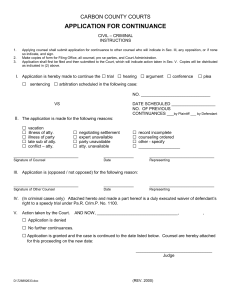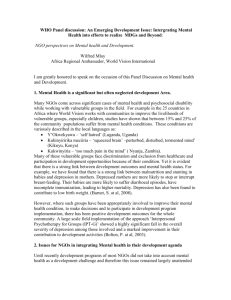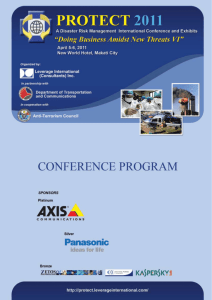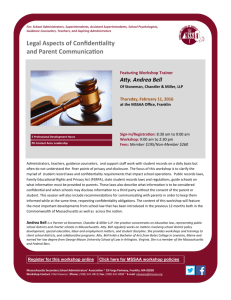Gender Analysis of Selected Economic Laws in the
advertisement
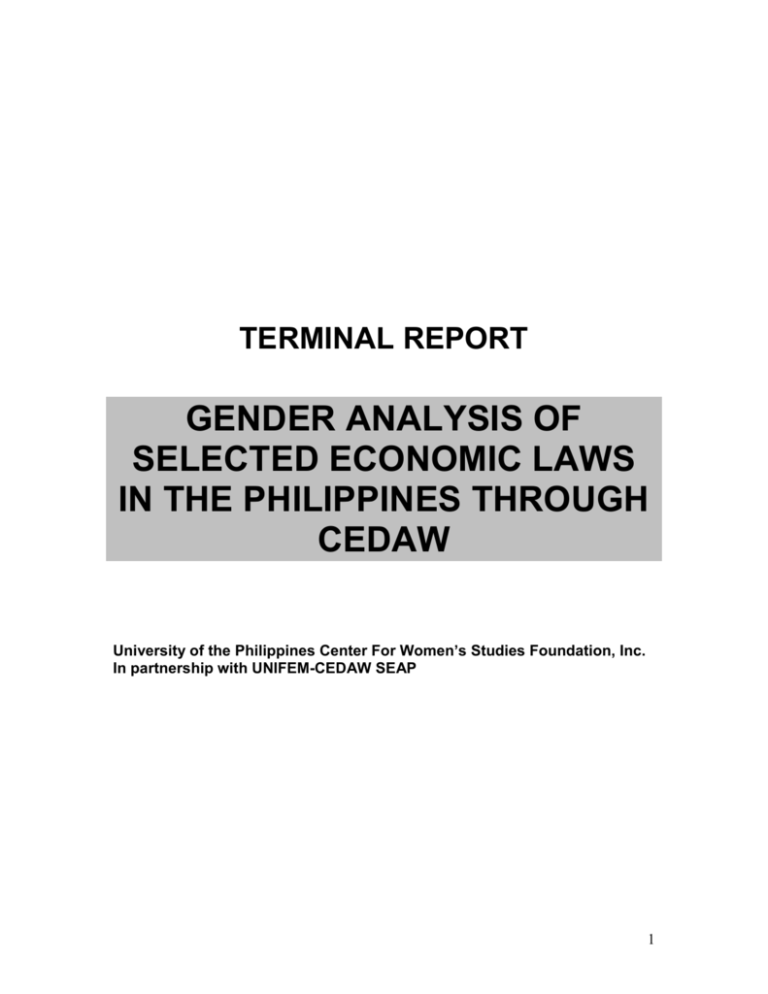
TERMINAL REPORT GENDER ANALYSIS OF SELECTED ECONOMIC LAWS IN THE PHILIPPINES THROUGH CEDAW University of the Philippines Center For Women’s Studies Foundation, Inc. In partnership with UNIFEM-CEDAW SEAP 1 ACTIVITY Gender Analysis of Selected Economic Laws in the Philippines Through CEDAW LOCATION Philippines RESPONSIBLE University of the Philippines Center for Women’s Studies Foundation, Inc. TIME FRAME September 2005 to March 2006 REPORT SUMMARY This is a legal advocacy research project that assesses the Philippine government’s compliance with the Convention on the Elimination of All Forms of Discrimination Against Women (CEDAW). It seeks to systematically review existing legislations in the areas of women’s human rights with a substantive focus on women’s economic rights and empowerment. It contributes in addressing the need to amend the laws that are discriminatory to women, particularly the Labor Code, the Cooperative Law and Cooperative Development Authority (CDA) Law, the Agrarian Reform Law, and the Women in Small Business Enterprises Act, Magna Carta for Small Enterprises, Social Reform and Poverty Alleviation Act and Barangay Micro Business Enterprises (BMBEs) Law. Leading the project was Dr. Carolyn I. Sobritchea, Director of the University of the Philippines Center for Women’s Studies (UPCWS). The researchers included Atty. E. (Leo) D. Battad, Atty. Milagros Isabel Cristobal-Amar, Atty. Ma. Luz Rañeses-Raval, Atty. Flordeliza C. Vargas and Dr. Rosalinda Pineda Ofreneo. Ms. Laniza R. Lacsamana and Ms. Adrienne L. Maguddayao provided the administrative and technical assistance. A gender analysis of the provisions and implementing rules and regulations (IRRs) of the economic laws was done to come up with proposed amendments in relation to the CEDAW and other international laws. 5 validation workshops were conducted with various stakeholders. The first validation workshop, held on November 15, 2005, was attended by 6 participants composed of lawyers, United Nations Development Fund for Women-CEDAW Southeast Asia Programme (UNIFEM-CEDAW SEAP) partners and NGOs. The second validation workshop, held on November 23, 2005, was attended by 6 representatives of NGOs, government organizations (GOs) and UNIFEM-CEDAW SEAP partners. The third validation workshop, held on November 25, 2005, was attended by five (5) representatives of NGOs and GOs. The fourth and fifth validation workshops, held on January 14 and February 9, 2006, had as participants, 20 organizations of home workers and other informal workers under HOMENET Philippines. The research findings were also presented in three advocacy fora. The first advocacy forum, held on January 23, 2006, was attended by 18 participants composed of UNIFEM-CEDAW SEAP partners, NGOs and GOs. The second advocacy forum was held on February 14, 2006 for the 45 members of the Committee on Women 2 of the House of Representatives. It was attended by 31 participants composed of legislators, their staff and representatives of NGOs. The third advocacy forum, held on March 29, 2006, was attended by 56 representatives of NGOs, primarily the members of the Rural Women’s Network, a national coalition of women’s group involved in rural development efforts. The final research report was then published, with 1,000 copies printed. ACTIVITY OBJECTIVES, OUTPUTS AND INDICATORS ACTIVITY OBJECTIVES 1 2 3 4 Review provisions and implementing rules and regulations of the economic laws for gender biases and discriminatory provisions. ACTIVITY OUTPUTS Biases/Gaps of economic laws. RESULTS Gender analysis of existing economic laws. Validate research findings with Five validation various stakeholders. workshops conducted. RESULTS Proposed amendments to existing economic laws. Undertake advocacy fora for Three advocacy various stakeholders. fora conducted. INDICATORS Matrices of economic laws, with proposed amendments in relation to CEDAW and other international laws. Proposed amendments to economic laws. Dissemination of the research findings and the support for legislative amendments. RESULTS Dissemination of the research findings and the support for legislative amendments. Develop advocacy materials for Advocacy Advocacy materials the dissemination of the research materials for the for the findings. dissemination of dissemination of the research the research findings. findings. RESULTS Advocacy materials for the dissemination of the research findings. 3 TARGET GROUP The groups that directly benefit from this project are selected legislators and their technical staff, the National Commission on the Role of Filipino Women (NCRFW), national agencies directly involved in the implementation and monitoring of the laws, non-governmental organizations (NGOs), as well as education, training and research institutions whose mandate include the promotion of economic empowerment among women. LESSONS LEARNED Given the voluminous amount of primary and secondary materials that were reviewed and the numerous laws that had to be examined, more time should have been given to the researchers to collect, analyze and write the research report. More time should have also been provided for the validation workshops so that each participant would have been able to ask questions and give their comments and suggestions, and the researchers would have been able to answer them. The participation of grassroots women's organizations involved in micro-enterprise and livelihood programs, micro-financing, and labor policy development and implementation was very valuable and they should always be represented in every activity. ACTIVITY LINKS AND SUSTAINABILITY The participants in the validation workshops verified the research findings and gave comments and recommendations both on the legal amendments and the actions that may be undertaken to advocate and initiate mobilization toward legislative reforms. The advocacy fora conducted were helpful in the dissemination of the research findings. Information dissemination provides various stakeholders with the knowledge to promote and start mobilization toward legal changes that will support women’s economic rights and empowerment. 4 SUMMARY REPORT PROJECT ACTIVITIES GENDER ANALYSIS OF SELECTED ECONOMIC LAWS IN THE PHILIPPINES THROUGH CEDAW 5 RESEARCH PHASE 1. Selection of Members of the Research Team and Preparation of the Study Framework and Methodology The project began with the selection of the members of the research team and the holding of a series of meeting with them to formulate the analytical framework of the research and methods of data collection and validation. These activities was followed by a briefing of the team members on CEDAW and other international human rights instruments as well as the current economic situation in the country. The research team was furnished with the latest relevant materials like the latest statistics on the status of women in the Philippines, particularly the sectors of formal and informal labor, agriculture and enterprise development. The researchers Atty. E. (Leo) D. Battad Atty. Milagros Isabel Cristobal-Amar Atty. Ma. Luz Rañeses-Raval Atty. Flordeliza C. Vargas, Dr. Rosalinda Pineda-Ofreneo Dr. Carolyn I. Sobritchea The Laws Reviewed Atty. Battad conducted the gender review of the labor code – Presidential Decree (PD) No. 442 (A Decree Instituting a Labor Code Thereby Revising and Consolidating Labor and Social Laws to Afford Protection to Labor, Promote Employment and Human Resources Development and Ensure Industrial Peace Based on Social Justice) and such other laws relevant to the advancement of women’s economic status and welfare as the following: Republic Act (RA) 7184 (Women in Nation Building Act), to define the role of women in politics and social progress; RA 6725 (Strengthening the Prohibition on Discrimination against Women) and RA 7877 (The Anti-Sexual Harassment Act of l995), to provide a safe, gender-fair, and gender-friendly environment in the workplace; RA 7882 (An Act Providing Assistance to Women Engaging in Micro and Cottage Business Enterprises, and for the purposes; RA 8289 (Magna Carta 6 for Small Enterprises); RA 8425 (An Act Institutionalizing the Social Reform and Poverty Alleviation Program, Creating for the Purpose the National AntiPoverty Alleviation Program, Creating for the Purpose the National AntiPoverty Commission, Defining its Powers and Functions, and for Other Purposes); and RA 9178 (An Act to Promote the Establishment of Barangay Micro Business Enterprises), Providing Incentives and Benefits therefore, and for Other Purposes), to provide access to credit and market; RA 7322 (Maternity Benefits in the Private Sector Act), RA 8187 (The Paternity Leave Act); RA 8972 (Solo Parents Welfare Act of 2000); RA 6972 (Barangay Level Total Development and Protection of Children Act), and RA 8980 (ECCD Act), to recognize the particular needs of workers and provide family support services to those with family responsibilities. Atty. Cristobal-Amar, for her part, did the gender review of RA No. 6938 (An Act to Ordain a Cooperative Code of the Philippines) and RA No. 6939 (An Act Creating the Cooperative Development Authority to Promote the Viability and Growth of Cooperatives as Instruments of Equity, Social Justice and Economic Development, Defining Its Powers, Functions and Responsibilities, Rationalizing Government Policies and Agencies With Cooperative Functions, Supporting Cooperative Development, Transferring the Registration and Regulation Functions of Existing Government Agencies on Cooperatives as Such and Consolidating the Same With the Authority, Appropriating Funds Therefore, and for Other Purposes) Two legal researchers worked on the gender review of RA No. 6657 (An Act Instituting a Comprehensive Agrarian Reform Program to Promote Social Justice and Industrialization, Providing the Mechanism for Its Implementation, and for Other Purposes) and RA No. 7882 (An Act Providing Assistance to Women Engaging in Micro and Cottage Business Enterprises, and for Other Purposes). They are Atty. Rañeses-Raval and Atty. Vargas. Dr. Pineda Ofreneo worked on three laws related to credit and enterprise development. These are RA No. 8289 (An Act to Strengthen the Promotion and Development of, and Assistance to Small and Medium Scale Enterprises, Amending for that Purpose Republic Act No. 6977, Otherwise Known as the "Magna Carta for Small Enterprises" and for Other Purposes), RA No. 8425 (An Act Institutionalizing the Social Reform and Poverty Alleviation Program, Creating for the Purpose the National Anti-Poverty Commission, Defining Its Powers and Functions, and for Other Purposes) and RA No. 9178 (An Act to Promote the Establishment of Barangay Micro Business Enterprises (BMBEs), Providing Incentives and Benefits Therefor, and For Other Purposes) Dr. Sobritchea wrote the introduction of the book, which describes the provisions of CEDAW and its relevance to the review of selected economic laws. She also 7 provided the background paper on the gender dimensions of economic issues in the Philippines. Methodology The legal researchers conducted the data collection strategies: Each one conducted a review of related literature that consisted of published studies and primary documents taken from the various government agencies tasked with the implementation and monitoring of the various laws. They held individual and group interviews with key informants from government and non-governmental organizations to get the latter’s opinions about the extent of gender-responsiveness of the aforementioned laws. After the collection of data, the research team held a series of meetings to agree on the method of analysis and writing the data. After the completion of the first draft of their manuscripts, the team met several times to discuss the improvements that had to be made in preparing the final research report. 2. Validation Workshops The second phase of the research project consisted of five validation workshops. These were meant to get the feedback of various stakeholders on the findings of the study. The first validation workshop, held on November 15, 2005, was attended by six participants composed of lawyers, UNIFEM-CEDAW SEAP partners and NGOs. The second validation workshop, held on November 23, 2005, was attended by six representatives of NGOs, GOs and UNIFEM-CEDAW SEAP partners. The third validation workshop, held on November 25, 2005, was attended by 5 representatives of NGOs and GOs. The fourth and fifth validation workshops, held on January 14 and February 9, 2006, had participants from 20 organizations of home workers and other informal workers under HOMENET Philippines. 3. Advocacy Forums The feedback from those who participated in the validation workshops was incorporated into the final copy of the research report. After this, the research team conducted three advocacy fora attended by legislators, representatives of various NGOs involved in economic projects for women and program personnel of government agencies. The first advocacy forum, held on January 23, 2006, was attended by 18 participants composed of UNIFEM-CEDAW SEAP partners, NGOs and GOs. The second advocacy forum was held on February 14, 2006 for 8 the 45 members of the Committee on Women of the House of Representatives. It was attended by 31 participants composed of legislators, their staff and representatives of NGOs. The third advocacy forum, held on March 29, 2006, was attended by 56 representatives of NGOs, primarily the members of the Rural Women’s Network, a national coalition of women’s group involved in rural development efforts. 4. Publication The final research report was published, with 1,000 copies printed. The book was launched on March 29, 2006 at the UPCWS Courtyard. VALIDATION WORKSHOPS As mentioned earlier, five validation workshops were conducted, three of which were held at the UPCWS Conference Room. The first validation workshop, held on November 15, 2005, was attended by 6 participants composed of lawyers, UNIFEM-CEDAW SEAP partners and NGOs. Lawyers UNIFEM-CEDAW SEAP Partners NGOs TOTAL NUMBER OF PARTICIPANTS 3 1 2 6 Ms. Luz Lopez-Rodriguez, National Coordinator of UNIFEM-SEAP, gave a brief overview of the project. Dr. Sobritchea then gave a rundown of the project activities, explaining the objectives of the validation workshop and announcing the dates of future activities. She also provided an overview of CEDAW and its relevance to the research. After that, Atty. Battad and Atty. Rañeses-Raval presented the findings of their study. Atty. Battad discussed the Labor Code while Atty. Rañeses-Raval discussed the Agrarian Reform Law. The participants then gave their comments and recommendations on the findings of the researchers. The second validation workshop, held on November 23, 2005, was attended by six representatives of NGOs, GOs and UNIFEM-CEDAW SEAP partners. NGOs GOs UNIFEM-CEDAW SEAP Partners TOTAL NUMBER OF PARTICIPANTS 3 2 1 6 9 The third validation workshop, held on November 25, 2005, was attended by five representatives of NGOs and GOs. NGOs GOs TOTAL NUMBER OF PARTICIPANTS 2 3 5 Atty. Battad made the introduction, explaining the objectives of the research and the framework used in the analysis of the economic laws. The presentation of the research findings by Atty. Cristobal-Amar, Atty. Rañeses-Raval and Atty. Battad then followed. The participants gave their comments and recommendations on the findings of the three researchers after each presentation. The fourth and fifth validation workshops, held at the University of the Philippines College of Social Work and Community Development (UPCSWCD) on January 14, 2006, and the DSWP Office on February 9, 2006, respectively, were attended by 20 organizations of homeworkers and other informal workers under HOMENET Philippines. The comments and recommendations on the findings of the researchers given by the participants in the five validation workshops helped in the crafting of the final research report. The following are the feedback from the participants: Use of gender-sensitive and/or gender-neutral words and phrases. Some words and phrases being used in the present economic laws are genderbiased. Although some of these words and phrases were included in the research report, a few were overlooked. Examples of these are the use of the word “personnel” instead of “manpower”, “gender” instead of “sex” and the use of the phrase “reproductive roles” instead of “maternity roles”. A more comprehensive definition of terms. Aside from being genderinsensitive, some words and phrases being used in economic laws are either too vague or too scholarly. There must be a more comprehensive definition of terms to help others understand these laws better, and also to avoid different interpretation of the laws. Inclusion of additional provisions that will promote women’s economic empowerment. The provisions of the existing economic laws are inadequate in promoting women’s economic rights and empowerment. Amendments must be made to help women gain equal footing with their male counterparts in the economic arena. One example is the provision of tax incentives or other bonus schemes to employers and/or companies that promote women participation in the workplace, and cooperatives that encourage women membership. 10 ADVOCACY FORA Three advocacy fora were conducted for the project. The first advocacy forum, which was held at the Conference Room, UPCWS on January 23, 2006, was attended by 18 participants composed of UNIFEM-CEDAW SEAP partners, NGOs and GOs. UNIFEM-CEDAW SEAP Partners NGOs GOs TOTAL NUMBER OF PARTICIPANTS 2 12 4 18 Ms. Luz Lopez-Rodriguez started the advocacy forum with a brief overview of the project. Dr. Sobritchea then explained the objectives and framework of the research. After that, Atty. Battad and Atty. Rañeses-Raval presented the findings of their study. Atty. Battad discussed the Labor Code and also presented the findings of Atty. Cristobal-Amar regarding the Cooperative Law and CDA Law. Atty. Rañeses-Raval discussed the Agrarian Reform Law. The participants then gave their comments on the findings of the three researchers. The second advocacy forum, which was held at the Conference Room 11, Ramon V. Mitra Building, House of Representatives on February 14, 2006, was attended by 31 participants composed of legislators and members of the House Committee on Women, their staff and representatives of NGOs. Legislators and Members of the House Committee on Women HOR Staff NGOs TOTAL NUMBER OF PARTICIPANTS 5 13 13 31 Rep. Josefina M. Joson, Chairperson of the House Committee on Women, made the opening remarks, highlighting the problems being encountered by women in the workforce and the importance of the research in improving and promoting women’s economic status. Dr. Sobritchea then gave an overview of the study. This was followed by the presentation of the research findings by Atty. Battad, Dr. Pineda Ofreneo and Atty. Cristobal-Amar. After the presentation, there was an open forum wherein the participants gave their comments on the findings of the researchers. The third advocacy forum, which was held at the Conference Room, UPCWS on March 29, 2006 was attended by 56 representatives of NGOs, primarily the members of the Rural Women’s Network, a national coalition of women’s group involved in rural development efforts. 11 At the start of the advocacy forum, Dr. Ma. Theresa D. Ujano-Batangan, Deputy Director for Training and Outreach of the UPCWS, made the welcoming remarks. Dr. Sobritchea then gave a brief overview of the project. The presentation of the research findings by Atty. Battad, Dr. Pineda Ofreneo, Atty. Cristobal-Amar and Atty. Flordeliza C. Vargas then followed. Atty. Vargas discussed the Agrarian Reform Law. After that, Ms. Zone Narito, Team Leader of WISEACT, gave her reactions to the presentation. An open forum wherein the participants gave their comments on the findings of the researchers then followed. PUBLICATION The final research report was externally reviewed by Atty. Myrna S. Feliciano and later revised for publication by the researchers. Mr. Nestor de Guzman and Mr. Ariel Manuel served as style editor and layout artist of the book, respectively. Ms. Gina Rose Chan acted as proofreader while Ms. Cristina Saulo designed the book cover. One thousand copies of the book were published, which was launched on March 29, 2006 at the UPCWS Courtyard. The books is currently being distributed to the libraries of the University of the Philippines and to the law libraries of other schools. Limited copies have been given to human rights and feminist lawyers, NGOs, and to the members of the UNIFEM-SEAP project partners. We are also advocating to teachers for the use of the book as reference materials for their classroom teaching. 12 13
